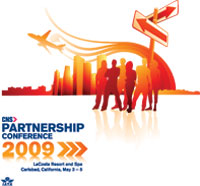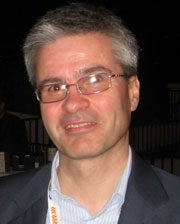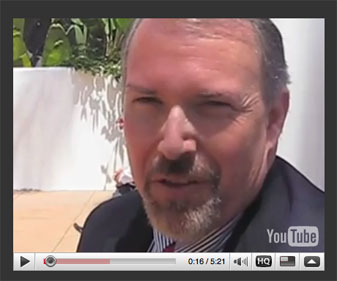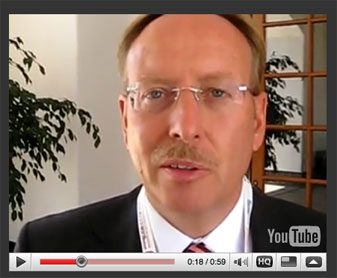
|
Vol. 8 No. 50 WE COVER THE WORLD Tuesday May 5, 2009 |
|
Partnership Conference—Day 2 |
 Dateline
Carlsbad—It may appear academic:
Dateline
Carlsbad—It may appear academic:
Air cargo industry heavily impacted by world financial
and business slowdown.
Industry executives witnessing downturn unprecedented in the history of air
or any form of transportation searching for answers.
Some businesses and their embattled executives
hunkering down to ride out the storm slashing all travel and trade show contact.
Others seeing that option as too narrow preferring
to expand understanding of what is going on all around, and what are best practices
to not only emerge from this time, but to also be equipped in meeting the challenge
of what may be a long climb back to ‘business as usual’ as recently
as this time last year.
 Into
this arena comes Aleks Popovich Head of Cargo at IATA.
Into
this arena comes Aleks Popovich Head of Cargo at IATA.
Popovich is studious, even professorial in appearance
and demeanor.
But Aleks has something that more and more stakeholders
feel could be a key ingredient to besting turbulent times in air cargo, he has
a plan for the future of the industry.
So whom do you want to call to uncover and get
some sense of what’s new and next for the air cargo industry?
The answer to that question is academic as well.
FT: Why is CNS important
now?
AP: At the World Cargo
Symposium in Bangkok we committed to drive the following priorities to Battle
the Crisis and Build the Future for the air cargo industry:
•
protect the industry's money (the 28b USD flowing through our worldwide
CASS System)
•
deliver simplicity and efficiency via e-freight
•
deliver quality and reliability via Cargo 2000
•
keep shipments secure via Secure Freight
CNS is critical to IATA's delivery of all these
priorities.
Over $USD4 billion of the $USD28 billion flows
through CASS USA and within CNS we have ensured that this money is well protected.
Expansion of e-freight in the USA beyond ORD and
JFK is absolutely pivotal to the growth of the e-freight route network.
Seven more USA airports are planned this year
for e-freight implementation working in close cooperation with the supply chain,
TSA and USA CBP: LAX, ATL, MIA, DFW, SFO, SEA, BOS.
We also are opening up e-freight imports to USA
with ANC activation as a transit point.
CNS actually leads on a global basis the Cargo
2000 project.
Finally CNS liaison with TSA on its CCSP is critical
to making the connection with Secure Freight.
In California this week we debate and agree how
the air cargo industry in the USA can battle the crisis and build the future.
A critical session prior to the CNS conference
is the meeting of the CNS Customer Advisory Board, who champion delivery of
the air cargo industry agenda for the USA.
FT: What can attendees
expect in terms of carry away from the conference?
AP: Moving from talk
to actions which will put the air cargo industry in better
shape.
FT: What
has CNS done and plans to do that is vital to air cargo?
AP: In 2008 CNS achievements
were:
•
e-freight implementation in ORD and JFK
•
launch of CASS USA Domestics
•
leadership of Cargo 2000 enabling the number of Cargo 2000 route maps to exceed
1 million in 1 month for the first time ever.
In 2009 - the focus is on growth. Growth of e-freight
in USA, growth of CASS, domestic growth of Cargo 2000.
FT: Describe
the current state of air cargo and what you expect in terms of business and
industry procedural development near and long term (timeline)?
AP: Global demand remains
at -21%, with fall off in yield a major issue. However fall off in demand looks
to have bottomed out.
There have been some early indications of small
recovery.
Too early to conclude - with manufacturers inventories
still high and final demand weak, an upturn in air freight is not yet in sight.
Air Freight has proved itself to be a highly sensitive
and very timely indicator of overall world trade volumes.
FT: There is a kaleidoscope
of topics being discussed at CNS.
Which points do you consider to be the most urgent
and important ones? Please name 2 or 3 and elaborate.
AP: Learn the lessons
of history to successfully battle the crisis and build the future for the air
cargo industry.
How to use the crisis to accelerate (yes accelerate!)
delivery of the industry agenda in the USA.
Here’s a new one - Air cargo's critical
role in time sensitive movement of pharma and lab specimens to support rapid
global response to "Swine Flu"
New Dream Team At CNS
|
LH Cargo Charter Flexible Flier
|
|
Air Cargo Meets The Press
|
Networking Into The Night
“Greatest networking
air cargo event in the world.” |
|
 |
The
Road To
|
 |
.
. . And now a few words on the action at
|
Publisher-Geoffrey Arend • Managing Editor-Flossie
Arend • Advertising Sales-Judy Miller
Send comments and news to geoffrey@aircargonews.com
Air Cargo News FlyingTypers reserves the right to edit all submissions for
length and content.
All Cargo Media, Publishers of Air Cargo News Digital and FlyingTypers
Copyright ©2009 ACM, Inc. All Rights Reserved. More@
www.aircargonews.com